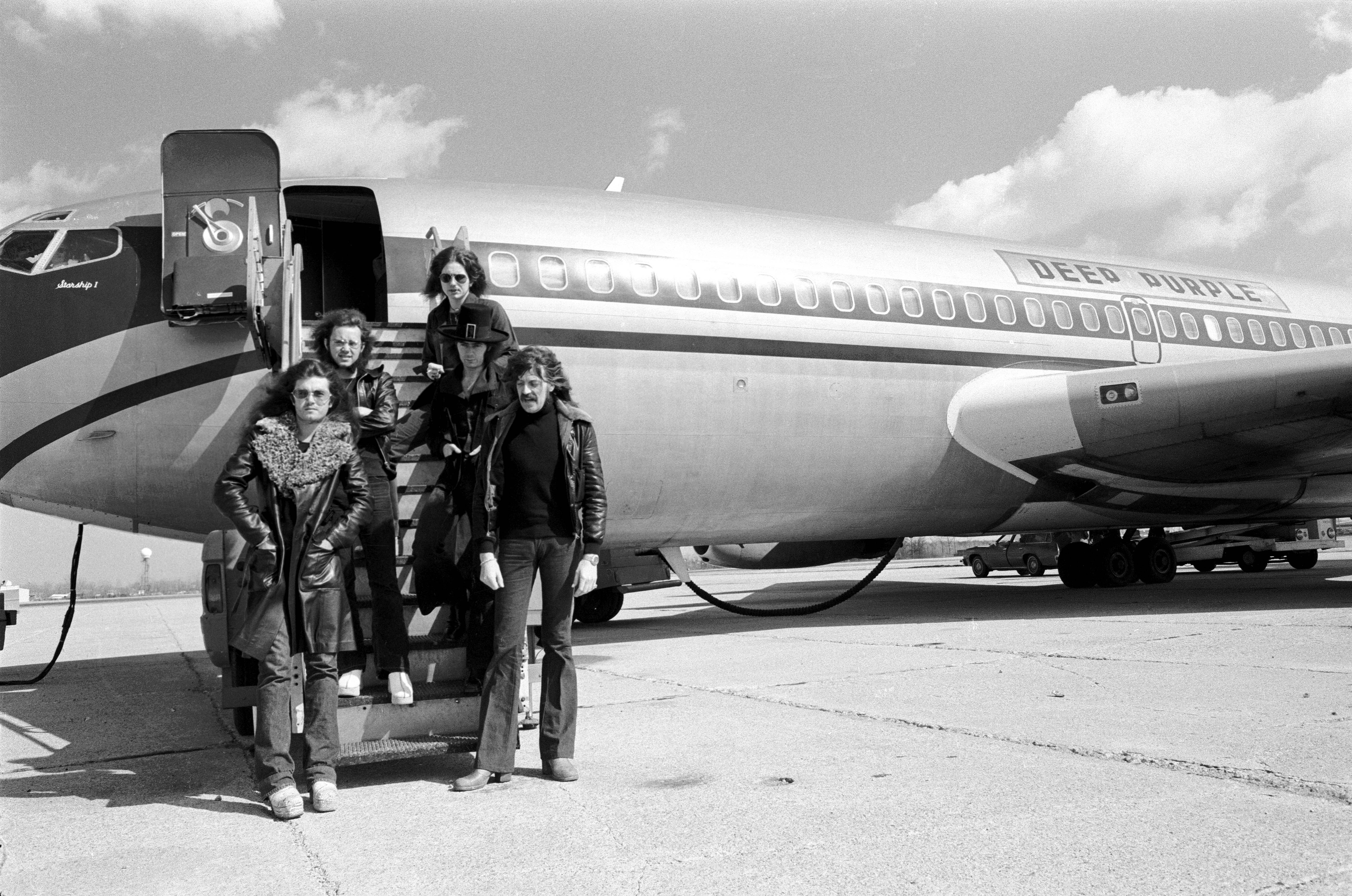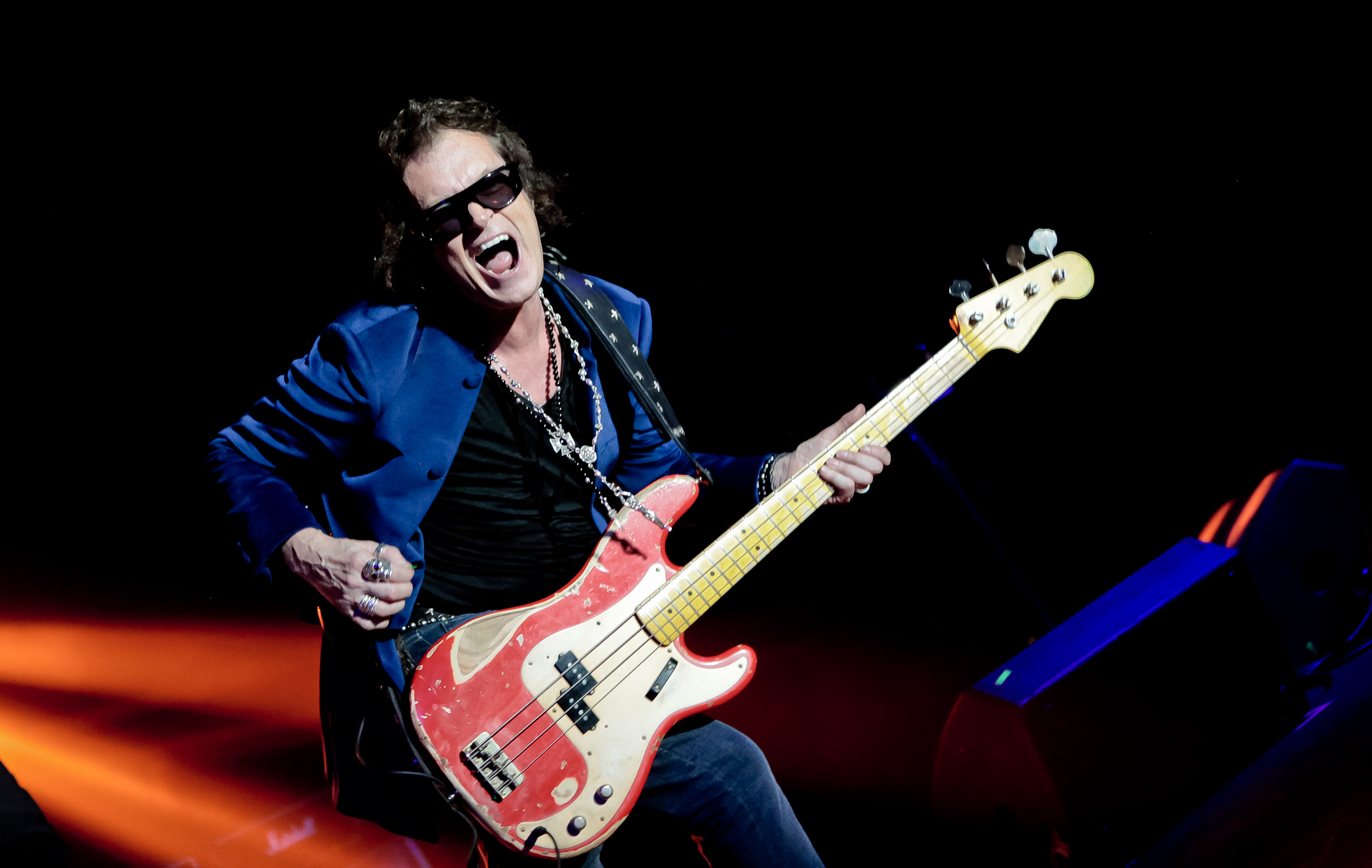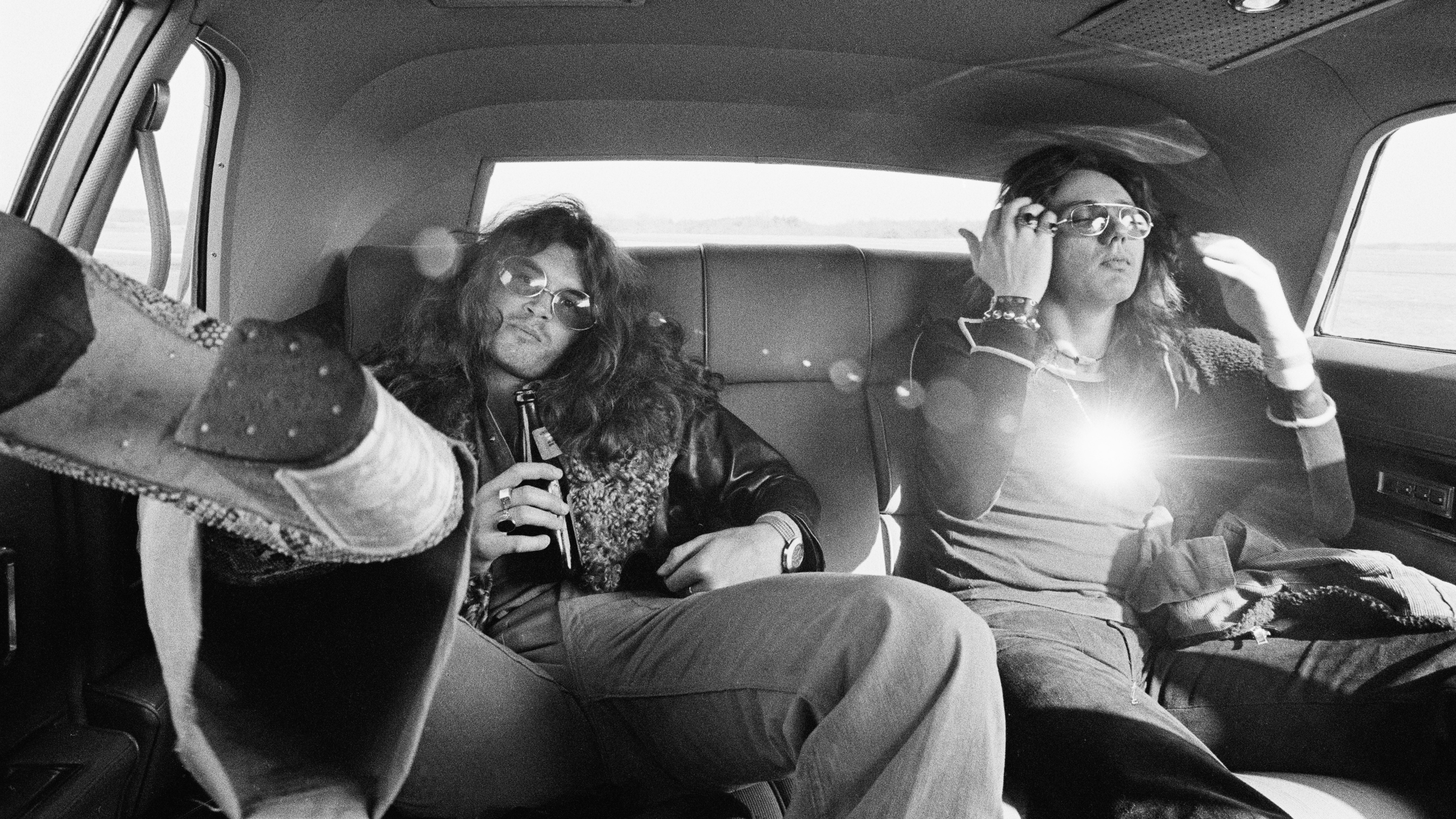This article originally appeared in Classic Rock #77.
Rehabilitation’ is an extremely familiar word to Glenn Hughes. Now in his fourth decade of making music, the Cannock, Staffordshire-born bassist/vocalist came to prominence as a raw 18-year-old in Midlands rockers Trapeze. But Hughes is chiefly remembered for the time he spent in the Mk III and IV versions of Deep Purple – the band that made him, and then broke him. “It was an amazing time,” Hughes recalls today, “even with all the egos and the weird shit going on behind the scenes.” Hughes gave Purple a controversially funky/soulful edge on albums such as Burn, Stormbringer and, especially, Come Taste The Band. But while in the group, he also descended into alcoholism and developed a voracious addiction to cocaine. Although Hughes never got into heroin, he found a soulmate in DP Mk IV’s American guitarist, the late Tommy Bolin, who was himself a smack addict. “Tommy and I were best mates, and we abused together,” Hughes once told Classic Rock. “It began to get out of control.”
Post-Purple, Hughes spent the best part of half a decade in a drug-fuelled haze, tooting away merrily in his Beverly Hills bunker, and making the odd solo record when the mist cleared. By the mid-80s, and following dalliances with Gary Moore, ex-Pat Travers guitarist Pat Thrall plus plenty more, Hughes’ weight had soared to 17 stone. He was consuming crates of Mars bars for breakfast and collapsing into cake trolleys at night. Even so, he still managed to make the fine Seventh Star album with Black Sabbath’s Tony Iommi – but all the while the snowstorm was intensifying. Finally, on Christmas Day 1991, Hughes wised up and “in a moment of clarity” made the decision to check himself into the Betty Ford Clinic – a move that undoubtedly saved his life.
He has now been clean, sober and spiritual for 13 years. Practically the first thing Hughes did when he got out of hospital was to record America: What Time Is Love? with British dance band The KLF, who immediately dubbed him The Voice Of Rock. But Hughes never quite managed to build on the momentum of that Top Five hit single. Now, maybe the time was right at last for, yes, Glenn’s musical rehabilitation. Because, surprisingly, 2005 found the VOR in his best shape ever. The 52-year-old was moving in exalted rock circles, and demanding the right to be heard.
Since you got sober, your career has often threatened to re-ignite but has never quite done so. You’ve been criticised for issuing too many albums, with too little quality control. Isn’t it time the real Glenn Hughes stood up?
It’s been a blessing and a curse being in Deep Purple. I don’t want to denigrate it, because those were great times. But the more I listen to the albums I’ve made in my years of sobriety the more I realise how far I’ve progressed as a songwriter. However, I realise I’ve got to focus and press those buttons more clearly now. Everybody in this industry has got their own thing about what Glenn Hughes should be. People say he shouldn’t sing soul, or he shouldn’t sing funk; he should just do rock, metal or whatever. That’s okay, but at the end of the day I’ve got to make a record that is going to hold up.

Your latest release, Soul Mover, is a rock/funk-fuelled inferno featuring Red Hot Chili Peppers drummer Chad Smith and guitar contributions from Dave Navarro (Chilis/Jane’s Addiction). You’re saying it’s “the most fulfilling album of my career”.
It is a big statement, but I haven’t said it before. And I think every artist gets excited about a new release, don’t they? But yes, it’s the most fulfilling because a lot of love was put into it. Chad is my best mate, and he co-produced the album and arranged the stuff with me, and JJ Marsh [who plays the majority of guitar on the album] is my secret weapon, as I’ve always called him.
We recorded the tracks live in the studio – not the vocals, the actual music – as we used to do in Trapeze and Deep Purple, and like most bands such as Led Zeppelin and Free did in the 70s. Today, the ProTools [music production software] generation has ruined all that – you’re never in the same room working with other musicians. Chad pushed me into taking that approach. He said: “We’ve gotta do this record where we stand in one room, in a semi-circle, and the amps can bleed into the drums. We’ve gotta make it a very live performance”. Lo and behold, it brought out a tremendous amount of passion in the playing.
- Glenn Hughes: I never fell out with Joe Bonamassa
- Deep Purple Albums Ranked From Worst To Best
- Trapeze: Hot Wire/Trapeze
- Rock Icons: John Bonham by Chad Smith
When did you first meet Chad Smith?
What you need to know about Chad is that, yes, he’s a member of the biggest rock band in the world and, yes, he’s an amazing drummer. But Chad Smith is also my soul brother – and I don’t use that term loosely.
I had a band called Shape 68. They were more American style, kinda funky, mid-tempo US rock – Sheryl Crow-ish, if you like. I wanted to air some songs at the NAMM [music trade] show in 2003. The drummer in my band, Robin Di Maggio, had an endorsement with Sabian [cymbals]. Anyhow, Chad was there at the show. We met up and found out that we’re huge fans of each other. It turned out he’s a big aficionado of Mks III and IV Deep Purple.
So Chad came to our rehearsal and he played on one song – Purple’s Stormbringer. And then he played on Mistreated as well. I immediately thought: “Shit, oh my god, oh bloody hell”. It was incredible. We ended up doing our actual show with two drummers.
Chad and I became best friends; we became inseparable. And then about a year later he met a girl and got married, and I was down there at the wedding – I sang there in church for them. Our wives are best friends, and we go on vacations together. And of course through Chad I’ve also become very friendly with [now former Chilis guitarist] John Frusciante. We just recently cut Nights In White Satin together, for a movie maybe.
And Dave Navarro?
Simply through Chad again. I met Dave at one of those Camp Freddy gigs in Hollywood – along with Lenny Kravitz, Juliette Lewis, the guy from Green Day and a whole bunch of other people. Chad and I were thinking about playing a gig somewhere in the US and doing it under a silly name. We were looking for a name guitar player, and we were also talking to Jerry Cantrell [of Alice In Chains fame]. Dave said he was up for doing it, but he was busy that week. So time went by, and then when I was cutting Soul Mover I just said to Chad: “What about if we get Dave to play on this?”.
Dave Navarro’s a rock god, you know. He’s really fucking good. I think in this league that I’ve stepped into now with these guys, it’s a little different. You’re playing a completely different game.
You were due to play some UK dates with Chad Smith on drums at the end of 2004, but they got cancelled…
It was Chad’s idea to do the UK, and I said: “Are you sure about this?”. And he said “Yeah”. So we arranged it. But unfortunately the Peppers overran on their next album, so Chad had to pull out. But Chad and I are talking about doing a big, big tour after the Peppers’ next set of dates, which could last 18 months.
Given your erratic output as a solo artist, how are you going to get across the message that Soul Mover isn’t just another Glenn Hughes album?
I think I’m coming into a rich vein of form at the moment that I haven’t had before. I mean, yeah, there have been too many silly tribute albums in the past, and too many B-minus projects. Not naming any names, of course. But that’s all gone now.
Classic Rock has always said one of my biggest downfalls is that I’ve done too much. And I have done, I admit it, but that’s simply because I’m so excited about making music. However, I’m taking a serious look at what I do now. With Soul Mover, Chad is 100 per cent behind it; he’ll do everything he can to help promote it. I’m doing a nine-week tour of Europe; I think I’m doing 52 shows. And we have the video clip for the Soul Mover song – which is a first for Glenn; you haven’t seen me on video forever. With some VH1 and MTV2 traffic, we’ll get there.

The Alarm recognised the ‘baggage’ surrounding their name and last year gained a hit record under the pseudonym the Poppy Fields. Would you ever consider making a similar move?
Oh God yes, I’d drop my name in a second. Five or six years ago I got offered a good deal by a jazz label to make a jazz record, and go out with some big jazz artists across America. It wouldn’t have used my name. And I almost did it. I enjoy all genres of music. And I could’ve pulled it off, because the stuff I demo’d was really strong. I could’ve got signed as a jazz artist.
You also have some exciting plans lined up with Black Sabbath guitarist Tony Iommi.
Tony and I have just signed a deal with Sanctuary in the US. What’s to come is going to be spectacular – though I say it myself. We’re a trio and we might be called a band name… we might be called Iommi-Hughes; we’re kicking a few ideas around. Kenny Aronoff is our drummer.
I’ve got to be careful what I say, but we’re mixing our album right now as we speak [on December 30, 2004] and when you go to press it’ll be finished. This will be the big wake-up call; it’s a stunning record. Tony is the greatest riff writer of all time… and now he’s got a new project with songs that are very, very, very strong. This could be the one that unlocks the door for me [This was released as a solo Iommi album in 2005. It was called Fused].
I think Tony and I are looking at a future here. You heard the stuff I did with him on [1986 album] Seventh Star, and The DEP Sessions we did together in 1996 were released officially last year. With Soul Mover going in the direction I want it to go, I don’t need anything else right now. So it’s goodbye to the Hughes-Turner Project [Glenn’s band with singer Joe Lynn Turner], and cheerio to all the side projects that I maybe should have stopped two or three years ago.
So, at last, this could be the year of Glenn Hughes?
This is unfinished business because of all the crap that went on in the mid-80s, with the Mars bars [a reference to his time with Gary Moore] and that other shite. It’s been a long time since I’ve had a drink and a drug – it’s 13 years now. No one talks about it anymore; it’s too long a fucking time ago. I feel better than I did when I was 25; I’m a passionate singer and I love to play live. I’ve got everything I need. Everything I need, God has given to me. I’m totally clean and sober, and every day of my life is gravy – it’s just gravy for me. All I do is just show up, you know.
For more on Glenn Hughes, then click on the link below.

